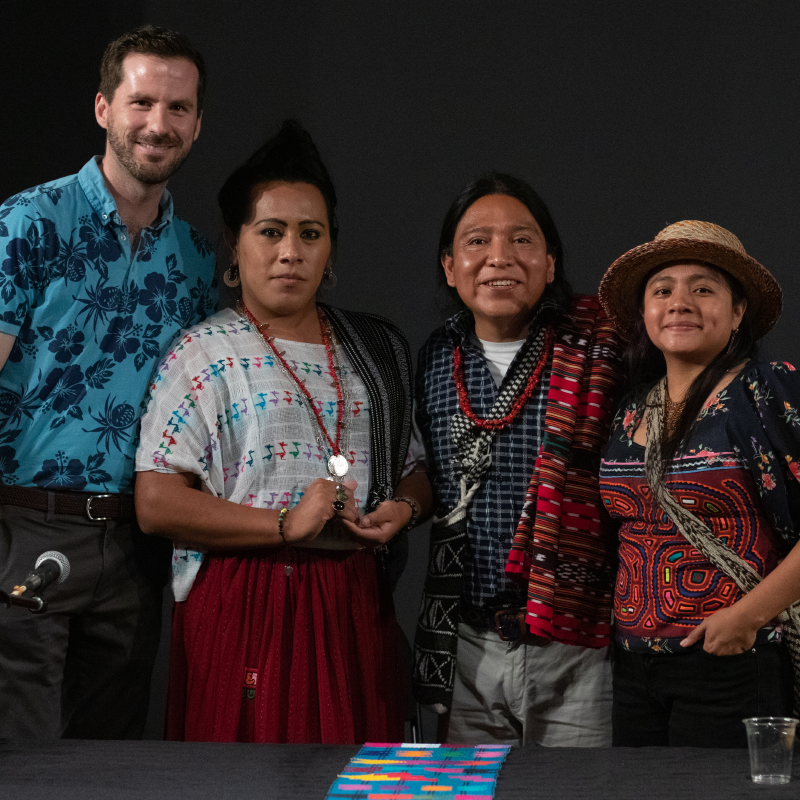Three Queer Indigenous activists from Latin America shared their experience and perspectives with an audience of Manitobans earlier in June, at an event co-hosted by MCIC, Dignity Network Canada, and Inter Pares. The trio came to Winnipeg to attend and speak at the Canada Pride Human Rights Conference from June 1-3 and spent the evening of June 2 at Urban Shaman Contemporary Aboriginal Art Gallery bringing their message to the public.
Each of the visitors are powerful and accomplished activists in their countries and communities. Olowaili Green Santacruz is an Indigenous Guna woman, lesbian activist, and filmmaker from Colombia. Her films portray women and diverse perspectives, telling stories that challenge traditional views of gender and race.
Mónica Chub Caal and Fernando Alvarez both traveled from Guatemala. Mónica is a Maya Q’eqchi woman, and is a prominent Trans activist and organizer. Fernando is a Maya K’ichè sexual dissident and organizer, whose group Red Multicultural de Mujeres Trans (Multicultural Network of Trans Women) brings together largely Indigenous Trans women from across Guatemala.
"What we want in our society is more love, and less hate."
The panel discussion centered on the intersectional challenges faced by the Queer Indigenous community in Latin America. Many contemporary Indigenous communities are still influenced by fundamentalist gender norms introduced through colonialism. As a result, Queer Indigenous people often face alienation from their culture and even exclusion from their communities after coming out. Many hide their identities in order to live in their communities and with their culture. Others who embrace their gender and sexual identity face racism from the LGBTQ community.
The speakers also brought advice on how to stand up for victims of discrimination in all forms, and how to create a world where all identities are safe and respected. Mónica laid out a clear call to action:
“When we are witnesses to violence against our people, we can't allow it to happen,” she said. “It's through solidarity that we can protect the people around us ... We can fight against [discrimination] with social networks, helping people understand where they can reach out for support. We can replicate this solidarity within our family groups as well, so that parents and children and nephews and nieces are all supporting us. Because what we want in our society is more love, and less hate.”
Fernando, Mónica, and Olowaili each drew parallels between the discriminatory and racist treatment of Indigenous communities in Canada and their own countries of Guatemala and Colombia.
“Recently, maybe 50 years ago, my father and my mother, my aunts and my uncle could not speak K'iche, our Mayan language, in public school and cannot wear any indigenous dress,” recounted Fernando. “I was thinking also, what's the link between the [structural racism] and the hate against LGBT people? And you can see that it's very similar, because it's the ideology: some people who have power and privilege to think that they can kill, or can erase, another group of people.”
.jpg) |
Doug Kerr, Executive Director of Dignity Network Canada, introduces the panelists to an audience at Urban Shaman on June 2. |
Despite the problems facing them and their work, the panel took inspiration from their experiences in Winnipeg. Each panelist cited the visibility and celebration of Two-Spirited people in Canada as a revelation, and an aspirational example of how Queer Indigenous identities can be celebrated and embraced in both culture and identity.
“It seems to me a beautiful thing, a very important thing, and a very political thing that here you have Two-Spirit in the [2SLGBTQ+ acronym], and that it is in the front,” said Olowaili. “In Colombia we are also trying to search for that ancestral diversity... One of the consequences [of colonization] was the erasure of the diversity that existed among us.”
The conversation concluded on another optimistic note, as Olowaili invited the audience to continue the work of ensuring human rights for all. “There’s a lot of work to do. That’s why we’re still young and beautiful; to continue fighting.”
Monica, Fernando, and Olowaili’s visit to Canada was made possible by hard work and generous support from Global Affairs Canada, Inter Pares, Dignity Network Canada, the Steelworkers Solidarity Fund, CUPE, and the Canadian Embassies in Guatemala and Colombia.
Want to hear about events like this one from MCIC and our members? Check out our Upcoming Events page, or subscribe to our Global Citizens e-newsletter to get them straight to your inbox every month, alongside stories like this!

